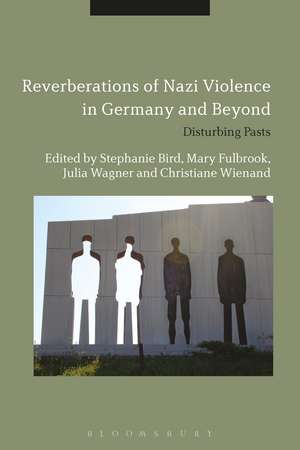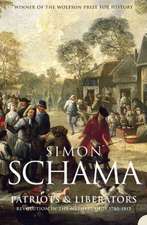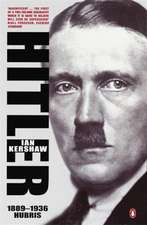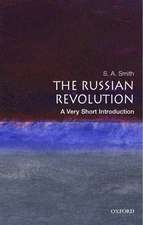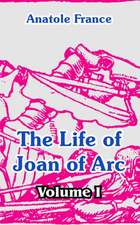Reverberations of Nazi Violence in Germany and Beyond: Disturbing Pasts
Editat de Dr Stephanie Bird, Professor Mary Fulbrook, Dr Julia Wagner, Dr Christiane Wienanden Limba Engleză Paperback – 23 aug 2017
| Toate formatele și edițiile | Preț | Express |
|---|---|---|
| Paperback (1) | 258.96 lei 43-57 zile | |
| Bloomsbury Publishing – 23 aug 2017 | 258.96 lei 43-57 zile | |
| Hardback (1) | 775.43 lei 43-57 zile | |
| Bloomsbury Publishing – 24 feb 2016 | 775.43 lei 43-57 zile |
Preț: 258.96 lei
Nou
Puncte Express: 388
Preț estimativ în valută:
49.57€ • 53.86$ • 41.66£
49.57€ • 53.86$ • 41.66£
Carte tipărită la comandă
Livrare economică 21 aprilie-05 mai
Preluare comenzi: 021 569.72.76
Specificații
ISBN-13: 9781350045644
ISBN-10: 1350045640
Pagini: 312
Dimensiuni: 234 x 156 x 23 mm
Greutate: 0.44 kg
Ediția:NIPPOD
Editura: Bloomsbury Publishing
Colecția Bloomsbury Academic
Locul publicării:London, United Kingdom
ISBN-10: 1350045640
Pagini: 312
Dimensiuni: 234 x 156 x 23 mm
Greutate: 0.44 kg
Ediția:NIPPOD
Editura: Bloomsbury Publishing
Colecția Bloomsbury Academic
Locul publicării:London, United Kingdom
Caracteristici
World-renowned academics and emerging scholars from a range of disciplines combine to offer a variety of assessments and interpretations
Notă biografică
Stephanie Bird is Senior Lecturer in German and Vice-Dean of the Faculty of Arts and Humanities at University College London, UK. She is the author of Women Writers and National Identity (2003) and Recasting Historical Women: Female Identity in German Biographical Fiction (1998).Mary Fulbrook is Professor of German History and Dean of the Faculty of Social and Historical Sciences at University College London, UK. She is the author or editor of more than 20 books including A Concise History of Germany (3rd edition, 2015) and A History of Germany 1918-2014: The Divided Nation (4th edition, 2014). Her most recent publications include Dissonant Lives: Generations and Violence through the German Dictatorships (2011) and the Fraenkel Prize winning A Small Town near Auschwitz: Ordinary Nazis and the Holocaust (2012).Julia Wagner is Research Associate in the Faculty of Arts and Humanities at University College London, UK.Christiane Wienand is Research Associate in the Faculty of Arts and Humanities at University College London, UK.
Cuprins
1. Introduction: Disturbing the Past/Disturbed by the Past - Stephanie Bird and Mary Fulbrook (both University College London, UK)Part I - Emotional Connections2. Troubling Issues: Guilt and Shame among Persecutors and Persecuted - Mary Fulbrook (University College London, UK)3. Shamed by Nazi Crimes: The First Step towards Germans' Re-Education or a Catalyst for their Wish to Forget? - Ulrike Weckel (University of Giessen, Germany)4. Ashamed About the Past: The Case of Nazi Collaborators and their Families in Postwar Dutch Society Ismee Tames - (Institute for War, Holocaust and Genocide Studies, The Netherlands)5. Autobiography, Moral Witnessing, and the Disturbing Memory of Nazi Euthanasia Susanne Knittel (Utrecht University, The Netherlands)Part II - Disturbing Narratives6. Disturbing Mending: On the Imagined Third Generation of Holocaust Survivors in Israeli Literature of the Second Generation - Tsila Ratner (University College London, UK)7. Disturbing the Past: The Representation of the Waldheim Affair in Robert Schindel's Der Kalte - Katya Krylova (University of Nottingham, UK)8. The Return of the Jew in Polish Culture - Uilleam Blacker (University College London, UK)Part III - Fascination / Pleasure9. Don't Mention the War - Julian Petley (Brunel University, UK)10. 'However sick a joke.': On Comedy, the Representation of Suffering, Rainer Werner Fassbinder's Melodrama and Volker Koepp's Melancholy - Stephanie Bird (University College London, UK)11. Disturbing Anselm Kiefer - Caitriona Leahy (Trinity College Dublin, Ireland)Part IV - Better Futures? (Dis)Placing Identities 12. German Tourists in Europe and Reminders of a Disturbing Past - Julia Wagner (University College London, UK)13. Reverberations of a Disturbing Past: Reconciliation Activities of Young West Germans in the 1960s and 1970s - Christiane Wienand (University College London, UK)14. Disturbing Pasts and Better Futures? A Comparison of Recent Approaches to the Past among Bukovina Jews and Bukovina Germans - Gaelle Fisher (University College London, UK)15. How to Cope with It? The Steuben Society of America's Politics of Memory and the Holocaust - Julia Lange (University of Hamburg, Germany)Afterword: Hauntings and Revisitings across Generations - Lisa Appignanesi (King's College London, UK)BibliographyIndex
Recenzii
This is a fascinating collection of stimulating essays . there is much to recommend the volume, including the interdisciplinary and transnational approaches the authors take in investigating the 'development of narratives, experiences and disturbances'. The volume also recommends itself by moving away from broad, amorphous collectives in the construction of memory and towards the individuals' roles in these processes in their concrete contexts. What emerges are subtle insights and ample food for thought.
The Second World War was a global, in particular European experience of extreme brutality, of violence both inflicted and endured. This book explores the many ways these experiences are still haunting individuals and communities and the ways they deal with their disturbing presence. There is a common knowledge provided by this powerful collection of articles from many disciplines of the humanities: that there is no mastering of the past, no healing. From our presence, the past will not go away, it will not die with those who lived through it, and even when it seems vanished it is waiting for us to be rediscovered and reproduced as painful, confusing or abused, but always disturbing.
This is an engaged and engaging, fascinatingly wide-ranging intervention in the "memory boom": a collection of ethically and narratively aware essays that range across history, theory, and cultural production to challenge and explore past and present, self and memory as relational, shifting, and dynamic. It is bound to provoke and influence debate.
This multidisciplinary collection brings together an international group of historians, film critics, and literary scholars who examine the ways in which troubling echoes of the Nazi past have disturbed and disrupted what are now our past presents - often in unexpected ways. Focusing on emotional and artistic responses to the extreme violence of the 1940s, the case studies that make up this superb volume take a novel approach to the idea of "collective memory," showing how the reverberations of traumatic past events not only affect the present but are also shaped by the present. What is especially attractive is the way in which the authors collectively show how the same phenomena could affect different communities in vastly different ways.
This is an excellent and timely volume that shows clearly how the memory of National Socialism continues to haunt Europe. Following recent developments in memory studies, it adopts a transnational approach, while not forgetting the importance of the national context. It is theoretically well informed, yet the contributions have a solid empirical basis and are lucidly written. The book will be of great benefit to students and scholars, and be of interest to the general reader.
The Second World War was a global, in particular European experience of extreme brutality, of violence both inflicted and endured. This book explores the many ways these experiences are still haunting individuals and communities and the ways they deal with their disturbing presence. There is a common knowledge provided by this powerful collection of articles from many disciplines of the humanities: that there is no mastering of the past, no healing. From our presence, the past will not go away, it will not die with those who lived through it, and even when it seems vanished it is waiting for us to be rediscovered and reproduced as painful, confusing or abused, but always disturbing.
This is an engaged and engaging, fascinatingly wide-ranging intervention in the "memory boom": a collection of ethically and narratively aware essays that range across history, theory, and cultural production to challenge and explore past and present, self and memory as relational, shifting, and dynamic. It is bound to provoke and influence debate.
This multidisciplinary collection brings together an international group of historians, film critics, and literary scholars who examine the ways in which troubling echoes of the Nazi past have disturbed and disrupted what are now our past presents - often in unexpected ways. Focusing on emotional and artistic responses to the extreme violence of the 1940s, the case studies that make up this superb volume take a novel approach to the idea of "collective memory," showing how the reverberations of traumatic past events not only affect the present but are also shaped by the present. What is especially attractive is the way in which the authors collectively show how the same phenomena could affect different communities in vastly different ways.
This is an excellent and timely volume that shows clearly how the memory of National Socialism continues to haunt Europe. Following recent developments in memory studies, it adopts a transnational approach, while not forgetting the importance of the national context. It is theoretically well informed, yet the contributions have a solid empirical basis and are lucidly written. The book will be of great benefit to students and scholars, and be of interest to the general reader.
